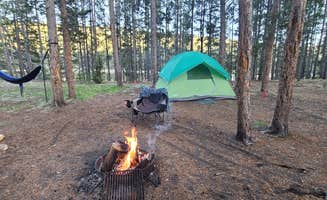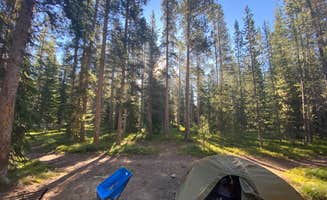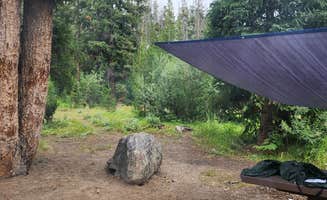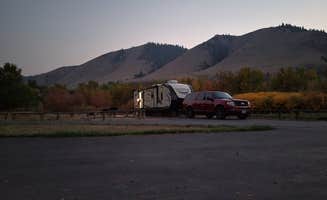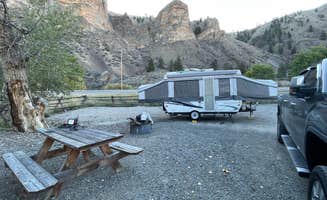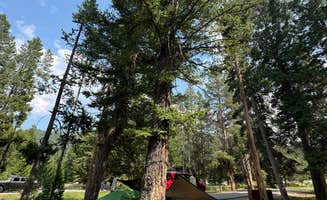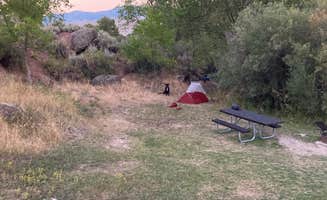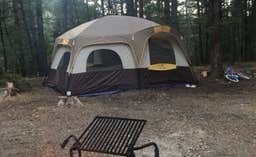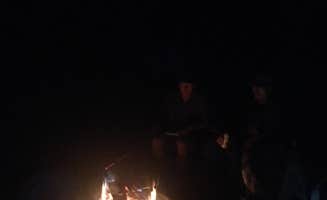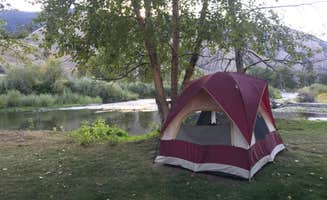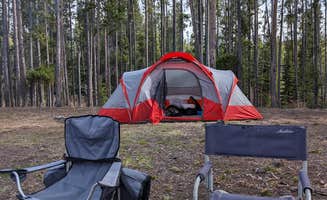Camping spots near Jackson, Montana offer access to the Pioneer Mountains ecosystem at elevations typically ranging from 6,000-7,000 feet. Overnight temperatures can drop significantly even in summer, with campers reporting readings near 30°F in July at higher elevation sites. Most campgrounds in the area operate seasonally from mid-June through early September due to snowfall potential at these higher elevations.
What to do
Gemstone hunting at Crystal Park: Located a short drive from Price Creek Campground, this public dig site allows visitors to search for quartz crystals and amethyst. "A short drive to crystal park where you can dig up quartz and amethyst," notes Mitch G., who visited the Beaverhead National Forest sites.
Fishing in non-motorized waters: Twin Lakes Campground features clear waters with visible lake bottoms in shallow areas. "Clear water to see the bottom where it's shallow enough. No motorized boats allowed, so bring your own kayak or canoe and a fishing pole or two to enjoy the refreshing waters at the bottom of the mountains," writes madeline K.
Explore ghost town history: Walk through preserved 1860s buildings at Bannack State Park near Vigilante Campground. "The Ghost town allows you a look at how settlers and miners leaved in the early day of Montana. See the 1st Territorial Governors Manson (ok, small cabin). Almost all of building you can enter," explains Dexter I.
What campers like
Natural hot springs access: Elkhorn Hot Springs provides a welcome respite from cold mountain temperatures. "Walking distance to the rustic Elkhorn Hot Springs Resort where you can swim and get a bite to eat," mentions Mitch G. about staying at Grasshopper Campground.
Secluded waterfront sites: Visitors appreciate the privacy and lake access at North Van Houten Campground. "Nice little campsite near a small, quiet fishing lake. About 5 sites here with a pit toilet. No cell service. 10 mile rocky road in, but saw a fifth wheel, so its not impassable by any means," reports Tee C.
Abundant wildlife viewing: The remote nature of camping areas creates opportunities for animal sightings. "Tons of wild life to spend time with," notes Richard M. about North Van Houten Campground, highlighting the benefits of staying in less-developed areas.
High-elevation wildflowers: Summer brings spectacular blooms to higher campgrounds. "The wildflowers were amazing in early July," writes sarah about Price Creek Campground, which sits at approximately 7,000 feet elevation.
What you should know
Food storage requirements: Bear activity necessitates proper precautions at most camping spots. "This is bear country and there are food storage boxes located throughout the campground for shared use. I expect the presence of bears is also why they don't have any dumpsters on site," explains Todd M. about Grasshopper Campground.
Mosquito preparation: Insect pressure can be significant, particularly near water sources. "The mosquitos are terrible so bring lots of deet," warns Katie G. about Twin Lakes Campground.
Pack-out requirements: Most camping areas lack trash facilities. "No trash receptacles so pack it in, pack it out," notes Jordan V. regarding Grasshopper Campground.
Weather fluctuations: Summer snowfall is possible at higher elevations. "We got snow on Labor Day weekend (still Summer!), so check the forecast," cautions Mitch G. about camping in the Pioneer Mountains.
Tips for camping with families
Junior Ranger programs: Bannack State Park offers educational opportunities for children. "Kids visiting the park can work on a Jr. Ranger program. Great time to visit is when they have volunteers dressed in period clothing," suggests Dexter I.
Shallow swimming areas: Twin Lakes provides safe water access for young swimmers. "Perfect for first time swimmers," reports Kat S. about the non-motorized lake at Twin Lakes.
Plan for temperature swings: Pack appropriate sleeping gear for cold nights. "In July it gets to be around 30* F at night so bring lots of extra blankets," advises Katie G. about Twin Lakes Campground.
Large group campsites: Some locations accommodate multiple families. "Number five could park about six cars easy. Also you could pitch about 7 to 9 tents on it," notes R W. about Grasshopper Campground.
Tips from RVers
Access road considerations: Many camping spots require navigation of unpaved roads. "Overall it was a great campsite. There are currently 17 camping spots with a cabin as well. The campsite is located right on the lake and it's about a 15 mile commute on a gravel road to get there," explains Chris J. about accessing Twin Lakes.
Self-contained camping preparation: Limited facilities require advance planning. "Just empty your tanks and fill up on water, food and supplies in Dillon. Heavily shaded. Bring a generator to charge you bank," advises Richard M. about camping at Vigilante Campground.
Site selection for larger vehicles: Not all campgrounds accommodate bigger rigs. "Possible to fit 30' trailer. Will be difficult to maneuver," warns Richard M. about North Van Houten Campground.
Generator considerations: Engine noise disrupts the quiet environment. "I felt bad about running them because of the disruption in the serenity," notes Richard M. about using generators at Bannack State Park camping areas.


